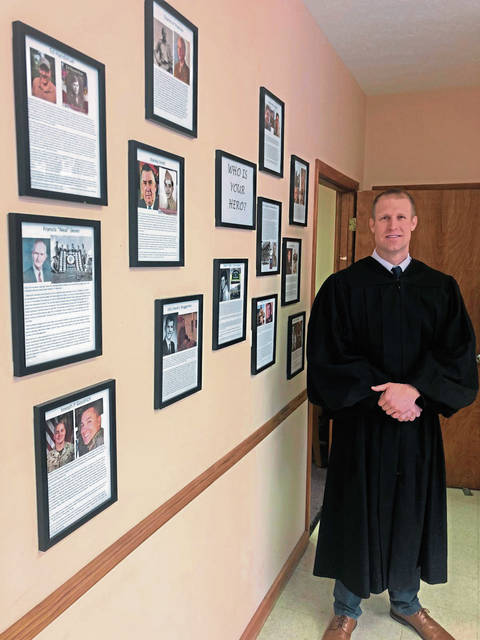https://triblive.com/local/south-hills/wall-in-judge-thatchers-court-recognizes-local-heroes/
Wall in Judge Thatcher’s court recognizes local heroes

The faces and stories of heroes who sacrificed greatly for our country line the lobby walls at District Judge Michael Thatcher’s court.
The heroes’ wall is intended to serve as inspiration for those coming to the district court on what could be one of the worst days of their lives and show them that others have succeeded despite adversity.
“This wall should be a reminder to anyone who comes into district court that they can find real heroes and role models right in their own community,” said Thatcher, whose court handles an estimated 6,300 cases a year — ranging from traffic citations to felony criminal cases — from Pleasant Hills, Jefferson Hills and South Park.
When Thatcher took over as district judge in January 2018, the walls of the lobby were bare. He said he thought for a long time about what might be the best way he could use the space.
The idea came to him to use the walls as a way to feature people from the community and beyond that have contributed to the greater good.
“There’s a lot of people that people probably look up to, and maybe there are better people to look up to,” Thatcher said.
He saw the wall as a way to inspire and motivate people.
Thatcher views district court as a place of justice.
“Justice is supposed to be fair and balanced,” he said. “They should feel like if they come in here, they’re going to be treated with respect and treated fairly. That doesn’t necessarily mean that whatever they want is going to happen.”
The wall provides a place for those waiting to have their case heard to gather that inspiration.
It currently features 12 heroes, although Thatcher is looking to expand.
Each plaque features photos and the story of the hero. They include Capt. Brandon A. Barrett, who served in the same company in the Marine Corps as Thatcher. Barrett was killed in action in Afghanistan and serves as a reminder that what truly matters is being a good person, with heart and courage, Thatcher said.
Another hero is Matt Lambert, who was at the Naval Academy alongside Thatcher. Lambert lost both of his legs in Afghanistan.
“He could have totally retired from the Marine Corps. But he went back to Afghanistan and earned his second Bronze Star on prosthetics,” Thatcher said.
On his plaque, it states: “Since the loss of his legs, he has still jumped from airplanes and run races. He is an absolute inspiration for anyone facing a challenge.”
The wall features numerous South Hills natives who did something extraordinary.
That includes Albert “Alby” J. Breisinger, a Pleasant Hills patrolman who lost his life while attempting to rescue two Pleasant Hills Middle School students from a sinkhole.
Another hero is Charles A. Thatcher, Michael Thatcher’s grandfather. He served in World War II and ran a Ford dealership in the community for many years. In Pleasant Hills, the history room at the library is named after him.
For Michael Thatcher, this is a personal hero.
Others on the wall came from recommendations from community members, police officers and municipal leaders.
The heroes on the wall also include Stanley Smith, a former Pleasant Hills mayor and police chief; Ed Handshue, who served in World War II and later became known in the community for his daily walks along Old Clairton Road in Pleasant Hills; and Eric McElvenny, who lost a leg while serving in the Marine Corps in Afghanistan and went on to run an Ironman Triathlon with a prosthetic.
Also on the wall are Francis “Neal” Sever, Joseph P. Goodrich, 1st Lt. David C. Bruggeman, Maj. David Borden and Jesse “Jay” McMulligan.
Each has a story of heroics. Many share their fight through adversity.
“People like that make America great,” Thatcher said. “Nothing that is worth doing is easy.”
Ed Guzek, a deputy constable for South Park who visits Thatcher’s court several days a week, said he feels solemn at first glance of the wall.
“Then you feel as you get closer to the wall and you start reading the accomplishments of the young men that gave up their lives for people they don’t know. They did it for virtue,” he said. “It makes you swallow hard.”
Guzek estimates that about 60% of the people who visit the court stop by to read the plaques on the wall.
“Some of them put their head down and they go back to their seat. Others say ‘Oh that’s just awesome.’ Sometimes they say ‘I wish my kid was like that,’ ” Guzek said. “To me, it’s special.”
Thatcher wanted to serve as a district judge because he wanted to make a difference in children’s lives.
“I always try to tell the kids that it doesn’t matter how smart you are. It doesn’t matter how good of an athlete you are. It doesn’t matter how good of a musician you are. Everything comes down to your character and your integrity and that’s that foundational thing about who you are,” he said.
Every person on the wall exemplifies that, Thatcher said.
Copyright ©2026— Trib Total Media, LLC (TribLIVE.com)
